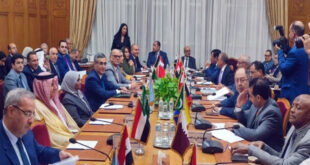Damascus, SANA-The regular meeting of ambassadors and heads of Syrian diplomatic missions abroad resumed its work on its third day, at the Ministry of Foreign Affairs and Expatriates in Damascus.
Foreign and Expatriates Minister in the caretaker government Dr. Fayssal Mikdad, said: Water has become a political issue, and our ambassadors and diplomatic missions need to know the situation of water resources in order to defend it before public opinion.
Mikdad added during the opening of the first session, which was attended by the Minister of Water Resources in the caretaker government, Engineer, Hussein Makhlouf: The Syrian diplomatic cadre’s knowledge of the water situation is an integral part of following up on international talks on water and the obligations that we must know when we negotiate this file.
In addition, Minister Makhlouf spoke about the importance of this meeting in enhancing close cooperation between the Ministries of Foreign Affairs and Expatriates and Water Resources, and the great reliance on Syria’s ambassadors and heads of diplomatic missions for their roles, whether in obtaining our water rights or in conveying the true image of Syria’s commitment to all water agreements with neighboring countries and with Arab brothers.
He Pointing out that we have a very important and well-studied projects, and we need partnerships with these friendly countries to implement it.
Minister Makhlouf reviewed the situation of water resources in Syria, the most important water projects, and the challenges of climate change.
During the meeting, Minister Makhlouf also mentioned the basic principles of public policies related to water resources and water-sharing agreements with neighboring countries.
Minister Makhlouf reviewed the water situation in the occupied territories, particularly, what the Israeli occupation is doing in stealing the waters of the occupied Syrian Golan.
He also spoke about the practices of the Turkish occupation and its affiliated terrorists in Hasaka and the northern countryside of Aleppo, and the deprivation of Hasaka residents from the water of Allouk water station, in addition to the destruction of this station.
Minister Makhlouf explained that the biggest concern now is securing water for Hasaka Governorate, noting that the state provides services in all areas of the governorate, but the biggest challenge is securing it inside the city, stressing Syria’s adherence to its water rights.
In a press statement, Minister Makhlouf pointed out that the employees of the Ministry of Foreign Affairs and Expatriates are not far from this sector and they are also our partners in the negotiations taking place in the water sector, saying: We rely heavily on this meeting to be a working paper with all ambassadors and heads of diplomatic missions to secure international cooperation, whether in terms of funding, partnerships, or in completing projects, whether studies, implementation, or otherwise.
The second session of the third day of the meeting hosted the Minister of Interior in the caretaker government, Major General Mohammad al-Rahmoun, where he reviewed the situation of the ministry’s work in issues related to the affairs of citizens outside Syria, pointing out to the ongoing cooperation between the Ministry of Interior and embassies in solving citizens’ problems through a joint committee between the two ministries to coordinate work on the services provided to displaced Syrians wishing to return.
He explained that cooperation is ongoing and immediate with our diplomatic missions through the Ministry of Foreign Affairs, and the questions of any citizen who visits the embassy are answered on various topics if he is covered by the settlement, especially the amnesty decree issued by Mr. President No. 7 of 2022, and we are continuing to work on it until now.
The third workshop addressed unilateral coercive measures, their negative effects, and ways to address its. It was moderated by Ambassador Dr. Imad Mustafa, Director of the Diplomatic Institute.
It included a legal refutation of the pretexts used by the US and the European Union to impose such illegal measures, in order to exert pressure on other countries that adhere to their sovereignty and the independence of their national decisions.
The experiences of countries in confronting the measures that targeted them were highlighted, in addition to coordinating international cooperation with friendly and allied countries in exposing the disastrous effects of those measures in various international forums.
A fourth workshop was held to discuss Western moves targeting Syria within the framework of exploiting various international organizations.
It discussed ways to confront the Canadian-Dutch allegations in the move against Syria before the International Court of Justice, and the Western and politicized exploitation of the Organization for the Prohibition of Chemical Weapons, and its efforts to establish biased mechanisms against Syria.
Manar Salameh
 Syrian Arab News Agency S A N A
Syrian Arab News Agency S A N A




